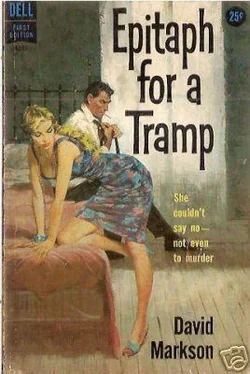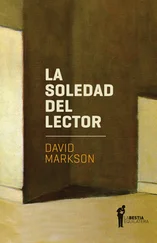Neva nodded. He was not the same frivolous lad who’d greeted us at the door a few minutes before. But then I had to wonder just who was.
“You pig,” Brannigan said. “You slimy, ugly, perverted son of a bitch. You — ah, the hell with it. You’ve been told. Get even a parking citation from here on out and you’ll see whether or not I’m just making conversation.”
He turned and looked at me, then went out. He went down the concrete stairs quickly and I didn’t rush to keep up with him. I was only a short way down when Neva called after me. I stopped and looked back.
“About Catherine,” he said hesitantly. “You didn’t say. Is anything the matter? I—”
“You know Ned Sommers?”
“Slightly, yes. The writer.”
“You could call him,” I said. “He’ll probably be interested, too. She’s dead.”
I couldn’t have told anybody why I’d bothered. I didn’t wait for his reaction. Brannigan was already in the car when I got down. The street was like a stokehold and my shirt was clinging to me.
“That was some dame, Fannin,” he said when I got in. “I never did congratulate you on getting divorced, did I?”
He didn’t expect an answer so I didn’t make one. He jerked away from the curb and then swung down into the lower east side of the Village before heading across toward Jones Street. I did not say anything all the way over. I kept seeing the photos of Cathy in my mind, and when I tried to get rid of them the only thing that came instead was an image of her on the floor in my doorway. It made the ride fun. I had such a swell choice of things to think about.
The Arthur Leeds address was another brownstone. Brannigan parked across from it and then sat there for a minute without opening the door. “Forget it, huh?” he said. “Rubbing you, I mean. Hell, you didn’t know how far she’d gone.”
“No, I didn’t.”
He made a sucking sound between his lips, leaning forward on the wheel. “I still don’t get it, you know. You. God knows, you’ve been around. And yet you stayed married to her for damned near a year.”
I didn’t answer him. He went on talking without looking at me.
“Promiscuous as a mink. And judging from the evidence, about as discriminating as a hungry hound in the town dump. You’ve gotten or a dozen buddies doing time who’d like to have fooled you that long.”
I still didn’t answer him. I took a cigarette and pulled on it deeply, watching the smoke break against the windshield.
“All right,” he said, “so it’s none of my business. You want to go in?”
I nodded, opening the door. I hadn’t answered him because I didn’t have any answers. I’d spent a year trying to get rid of what I’d felt about Cathy and then this morning had brought it all back. It was still rotten, thinking that things might have been different for her if she’d had some help, and I had to feel guilty about that. But I was not feeling much of anything else now. Brannigan was probably right that it would be something you would figure out sitting at a desk or using a phone, and even that did not bother me the way it would have six or eight hours before.
We were walking across. “Soon as we see this one we’ll check Coffey out,” he was telling me.
Leeds was listed for 3-B and it was another one we didn’t have to ring. Some misguided soul had hooked back the outside door in the hope that it might let a little cool air in. Maybe there was cool air on Annapurna or Orizaba. I dragged myself up the two rickety flights like an old-age pensioner. We found the door we wanted at the end of a corridor and Brannigan rapped on it.
That was when I noticed that the heat was getting to Brannigan also. He was sweating badly and his face was flushed. We heard a voice say, “Get that, will you, Henry,” and then when Henry opened the door and said, “Who intrudes?’’ Brannigan did not ask for Leeds the way he had asked for Sommers or Neva. He had his wallet in his hand and he lifted it with a tired gesture and said, “Police.”
The man in the doorway did almost nothing. He squinted out at us behind thick glasses as if he had not heard us correctly, and then he turned to repeat the word over his shoulder. “Police, dads?” he said curiously.
He didn’t get an answer. There were about six quick footsteps and then there was the sound of a chair clattering to the floor. A second after that a window went up, hard, jarring the weights inside its molding. The man in the doorway had blocked us unintentionally, but I had a hunch the elbow I planted in his liver would remind him to be less careless in the future. I saw the second man’s back as he cleared the window ledge, which was about twenty feet away in the far wall of a rear room, and then he was out of sight and rattling down a fire escape.
Twenty feet. A man with my stride, or Brannigan’s, can cover the distance from a standstill in approximately a second. We both started to, but neither of us quite made the window. Because the second hadn’t fully elapsed when the sound began, and when it came we were both rooted like snow-heavy birches, bent forward and frozen.
It was a man’s scream. I had heard one exactly like it a dozen years before in North Africa. Press me and I could tell you the date, the name of the crossroads, exactly what I’d been doing when it happened. The G.I. had been sleeping off a binge on the edge of a ditch. When they’d backed the tank off him you could have peeled up what was left of his legs to wrap your holiday mailing.
Brannigan looked out first. He said, “Oh, God, oh, my God,” and a priest giving final rites would have had a voice just as hushed. After that he choked and was fighting to keep himself from vomiting and you could hardly blame him for that.
The man had gone down one flight of the fire escape toward the narrow yard below and then had changed his mind. There was an alley behind the building which faced on the next block and he had decided to go over there. There was a spiked fence between the yard and the alley, with its spikes sticking up about a foot above the crossbar which held them in place. The spikes were about an inch thick at the bar, tapering sharply to four-sided points from there upward. Evidently the man had climbed the railing at the second landing and tried to jump it.
Whoever he was, athletics obviously hadn’t been his long suit. Half of him had gotten across.
He was hanging face-downward with his arms and trunk over the far side and his legs toward us. The spikes were set closely enough together so that he had caught three of them in the bowels. They were sticking up through the back of his pants like dirty fingers through a moth-eaten scarf.
The shoelace he had tripped over was still swinging loose.
I climbed out. Brannigan was turning back to the man called Henry as I went, but Henry was not leaving. He wanted a look, too.
He got it as I was climbing down. From the way it tore him up, I gathered that the lad on the fence would be a grief he’d find hard to sustain. “Man,” I heard him say, “like shishkebob!”
I got down there. “Any point in an ambulance?” Brannigan said.
“Hearse, Nate.”
The deceased had been about thirty-five and a redhead, but you could not tell much from his face about anything else. He had bitten a deep gash into his tongue, which was hanging out like an empty mitten, and his eyes were bulging.
I stood there for a minute. He was impaled at just about the level of my shoulders and he did not look heavy. He would have leaked, however.
I glanced up. “You want me to?”
Brannigan’s face was drawn. The other man was still gaping. He was small and thin-faced and maybe forty, and his lenses looked thick enough to double as casters. “Leave him,” Brannigan said finally. “Wait a second.”
Читать дальше












